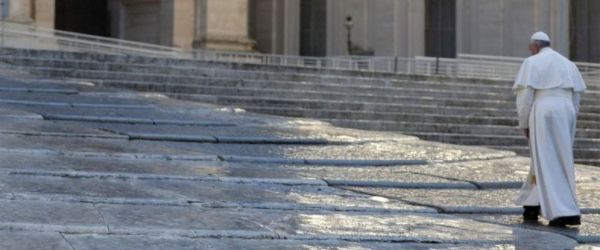Gospel presents to us the Parable of the Talents (cf. Mt 25:14-30). Before setting off on a journey, a man gives his servants talents, which at that time were coins of considerable value: he gives five talents to one servant, two to another, one to another, to each according to his ability. The servant who had received five talents was resourceful and he traded with them, earning another five. The servant who had received two behaved likewise, and acquired another two. However, the servant who had received one dug a hole in the ground and therein hid his master’s coin.
Upon the master’s return, this same servant explained to him the reason for this action, saying: “Master, I knew you to be a hard man, reaping where you did not sow, and gathering where you did not winnow; so I was afraid, and I went and hid your talent in the ground” (vv. 24-25). This servant did not have a trusting relationship with his master, but was afraid of him, and this hindered him. Fear always immobilizes and often leads to making bad choices. Fear discourages us from taking the initiative; it induces us to take refuge in secure and guaranteed solutions, and thus end up not accomplishing anything good. To move forward and grow on the journey of life, we must not have fear; we must have faith.
This parable helps us understand how important it is to have a true concept of God. We must not think that he is a cruel, hard and severe master who wishes to punish us. If this mistaken image of God is within us our life cannot be fruitful, because we will live in fear and this will not lead us to anything constructive. On the contrary, fear paralyzes us; it causes our self-destruction. We are called to reflect in order to discover what our idea of God really is. Already in the Old Testament he revealed himself as “a God merciful and gracious, slow to anger, and abounding in steadfast love and faithfulness” (Ex 34:6). And Jesus always showed us that God is not a severe or intolerant master, but a father full of love, of tenderness, a father full of goodness. Therefore, we can and must have immense faith in him.
Jesus shows us God’s generosity and care in so many ways: with his words, with his gestures, with his welcome toward everyone, especially toward sinners, the little ones and the poor, as today — the first World Day of the Poor — also reminds us. But he also does so with his admonitions, which show his interest so that we do not pointlessly waste our life. Indeed, it is a sign that God has great esteem for us: this awareness helps us to be responsible people in all our actions. Therefore, the Parable of the Talents reminds us of a personal responsibility and of a faithfulness that even becomes the ability to continually set out anew, walking new paths, without “burying the talent”, that is, the gifts which God has entrusted to us, and for which he will call us to account.
May the Blessed Virgin intercede for us, so that we may remain faithful to the will of God, cultivating the talents that God has given us. Thus we will be helpful to others and, on the last day, we will be welcomed by the Lord, who will invite us to take part in his joy.
[Pope Francis, Angelus 19 November 2017]












